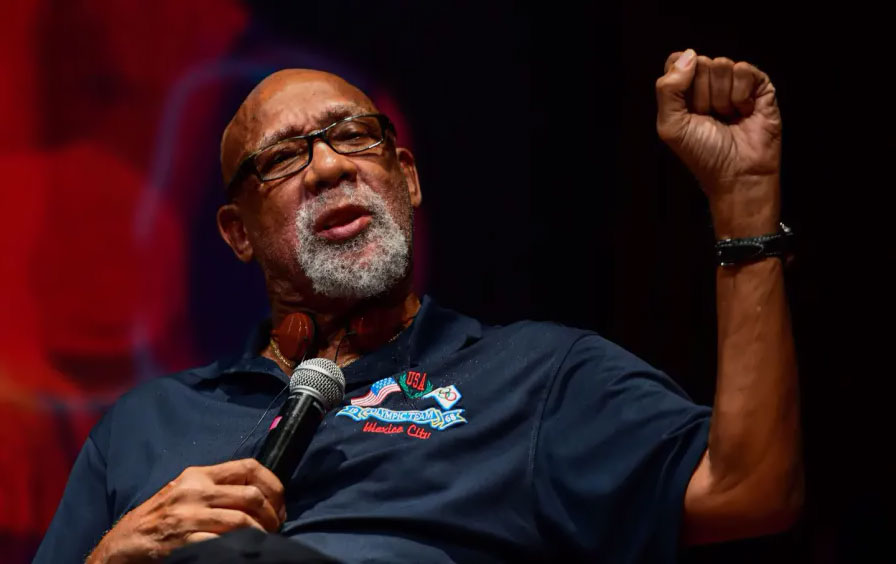At a time of global uprisings, the Olympic ban on political dissent is under renewed scrutiny.
By Dave Zirin and Jules Boykoff
As the winds of change whip through the world of sports, the International Olympic Committee (IOC) remains a windless desert full of dry-husk ideas that appear brittle amid today’s zeitgeist of principled athlete activism. While other sports leagues—like the National Women’s Soccer League—are making space for their athletes to express political dissent, the IOC is lagging behind, digging in its heels to argue that politics and the Olympics don’t mix.
But there is a burgeoning effort among Olympic athletes, and even some sports administrators, to loosen restrictions on athletes’ ability to engage in political protest. The moment is ripe to ditch the restrictive measure embedded in the Olympic Charter that bans political dissent. The IOC is living in the past. Politically minded Olympic athletes are rooted in the present and thinking about the future. They more than deserve space to protest injustice.
The Olympic Charter has long explicitly forbidden dissent. After John Carlos and Tommie Smith famously thrust their black-gloved fists into the Mexico City sky in 1968 for Black freedom and human rights, the IOC fashioned a rule to dissuade athletes from taking a similar stand. This takes the form of Rule 50 in today’s Olympic Charter: “No kind of demonstration or political, religious or racial propaganda is permitted in any Olympic sites, venues or other areas.”
In January, the IOC doubled down, issuing guidelines that delineated what it considers “protest,” rather than “political expression.” “Displaying any political messaging, including signs or armbands” is verboten, as are “gestures of a political nature, like a hand gesture or kneeling.” This suspiciously specific “non-exhaustive list” was an obvious response to two US athletes who had the temerity to make political statements on the medal stand at the 2019 Pan American Games: track athlete Gwen Berry, who raised a fist on the medal stand, and fencer Race Imboden, who took a knee.
Pressure is mounting from within the Olympic circle. The president of the Caribbean National Olympic Committees, Brian Lewis, stated publicly that Rule 50 must go. “My strong view is that Rule 50 can’t stand scrutiny,” he said. “It is explicitly linked to podium protests against racial injustices. It is the symptom of systemic racism and racial discrimination.”
In June, Global Athlete, the international, athlete-led group, issued a statement demanding the abolition of Rule 50, arguing that “silencing the athlete voice has led to oppression, silence has led to abuse, and silence has led to discrimination in sport.” The Athletes’ Advisory Council for the United States Olympic and Paralympic Committee agreed. The group teamed up with John Carlos to issue a similar plea to ditch Rule 50.
“Who knows what’s going to be in somebody’s heart? I don’t get to tell anybody what’s in their heart in that moment, when they get to reflect on how they got there and the country they come from. I feel like Rule 50 is a repudiation of that, a denial of what’s in your heart.”
US Olympian Gwen Berry told The Nation, “I think Rule 50 needs to be canceled for the simple reason that it goes against athletes’ human rights. There are rights inherent to all human beings and one is the freedom of speech.”
Berry is exactly right. The Olympic Charter’s Rule 50 stands in direct contradiction to the UN’s Universal Declaration of Human Rights, which states in Article 19:
Everyone has the right to freedom of opinion and expression; this right includes freedom to hold opinions without interference and to seek, receive and impart information and ideas through any media and regardless of frontiers.
The IOC’s blatant suppression of athlete dissent slices mightily against this sentiment.
The Olympic Charter’s Rule 50 has long been outdated. Today, amid worldwide protest, it is downright archaic. To squelch protest today is to advance white supremacy, since most recent protests by Olympic athletes were done either to raise awareness of racism and its ramifications—like Berry and Imboden—or by athletes of color who used the Olympics as a political platform for speaking truth to power in their home countries. As the protests sweeping the streets have shown us, white supremacy needs to go. Let’s make space for athletes to give that toxic ideology a firm nudge toward the dustbin of history.
Dave ZirinTWITTERDave Zirin is the sports editor of The Nation and the author of Game Over: How Politics Has Turned the Sports World Upside Down.
Jules BoykoffJules Boykoff is a professor of political science at Pacific University in Oregon and the author of four books on the Olympic Games, most recently NOlympians: Inside the Fight Against Capitalist Mega-Sports in Los Angeles, Tokyo.

